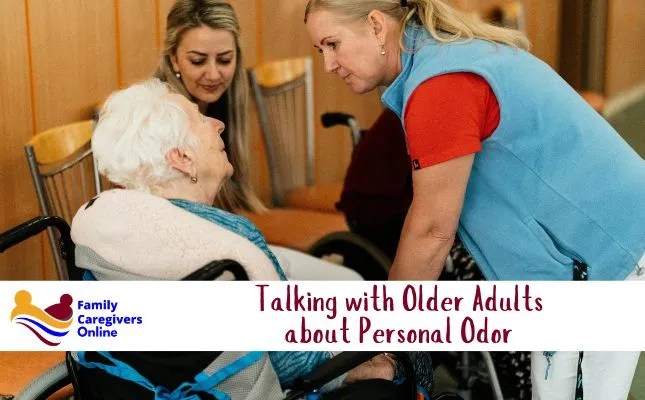


Caregivers often find it difficult to talk to their parents, spouses, or other loved ones about body odor. It is common among many older people. Using tact, good timing, and the right language, a care receiver can feel like their caregiver is providing loving care with respect.
Why Body Odor Happens
As a caregiver, you may notice changes in an older adult’s body odor over time. A distinct scent—often called “old person smell“—is common with aging. It is not always about poor hygiene. Natural changes in skin, sweat glands, and hormone levels can cause it, even if the person is clean and well cared for.
Read: Understanding and Managing Body Odor in Older People
That said, sudden or strong changes in body odor can sometimes signal a medical issue or a reaction to medication. If something smells noticeably different—especially in a facility or hospital setting—mention it to a nurse or doctor. Trust your nose; it’s often an early warning sign.
Still, in many cases, unpleasant odors are linked to hygiene issues. As mobility or memory declines, it’s easy for regular bathing, oral care, or laundry to slip. Gently and consistently supporting these routines can make a big difference in comfort, dignity, and health—for both of you.
Key Guidelines for Talking to Your Loved One About Odor
- Pick an Appropriate Time
- Choose a private, quiet, and calm setting.
- Avoid mealtimes or when they’re tired or frustrated.
- Morning, after breakfast, is often best.
- Be Compassionate and Respectful
- Use a gentle tone.
- Avoid sounding critical—this isn’t about blame.
- Remember: shame shuts people down; respect opens the door to change.
- Express Concern for Their Health
- Begin from a place of love and concern: “I care about your health and comfort.”
- Let them know you want to help them feel their best.
- Use “I” Statements
- Say: “I’ve noticed it seems harder for you to shower regularly.”
- Avoid: “You don’t bathe enough.”
- This helps reduce defensiveness and keeps the conversation supportive.
- Acknowledge Their Challenges
- Say: “I understand that it’s harder to bathe with your knee pain,” or “It seems like getting in and out of the tub is more difficult now.”
- Validate their experience and offer to problem-solve together.
- Discuss The Health Benefits of Good Hygiene
- Prevention of:
- UTIs
- Skin breakdowns
- Fungal infections
- If there’s been a recent issue (like an infection), gently refer to it as a reminder of why hygiene matters.
- Listen and Validate Their Feelings
- Give them time to talk.
- Be open to hearing their frustrations or fears.
- Let them feel heard—this builds trust and cooperation.
- Involve Others (When Needed)
-
If your loved one has difficulty understanding your concerns or becomes resistant, consider involving a trusted friend, another family member, or a care professional—someone they respect and feel safe with. Sometimes hearing the same message from a different voice can make a difference.
-
Be sure the person is someone your loved one respects and feels comfortable with.
-
Don’t view this as giving up—it’s simply another way to offer the support they need, while preserving your relationship and avoiding unnecessary conflict.
- Respect Their Independence
- Say: “I know it’s important for you to stay independent.”
- Work together on what kind of support they’d be willing to accept.
- Offer choices rather than commands.
- Offer Solutions, Not Just Criticism
- Visual aids: hygiene checklists, reminders, routine charts. Browse the internet for pictures or graphics that you can post as prompts
- Tools: long-handled sponges, no-rinse body wash, grab bars
- Help them brainstorm ideas—this keeps their dignity intact.
- Offer Direct Assistance
- “Would you like me to help you with the shower today?”
- “Would it help if we made a plan for how to manage bathing more easily?”
- Promote Self-Care and Self-Compassion
- Encourage them to view hygiene as self-respect, not a burden.
- Remind them they are worthy of comfort and care, even if they need help.
- Be Thoughtful with Gifts
- Consider non-allergenic soaps, lotion, comfy clothes, or uplifting items like books or favorite music.
- Check with facility staff about restrictions if they live in assisted care.
Final Note
This is about more than body odor—it’s about preserving dignity, comfort, and health. Approach these conversations with patience, empathy, and persistence. Change might be slow, but small steps matter.
By Zanda Hilger, LPC, Founder, Family Caregiver & Program Manager for Family Caregivers Online
Sources: Franklin Health; Passion Home Health Solutions; Senior1Care
We hope this information is helpful to you in the important work you do as a family caregiver.
For more resources, subscribe to our free newsletter!








